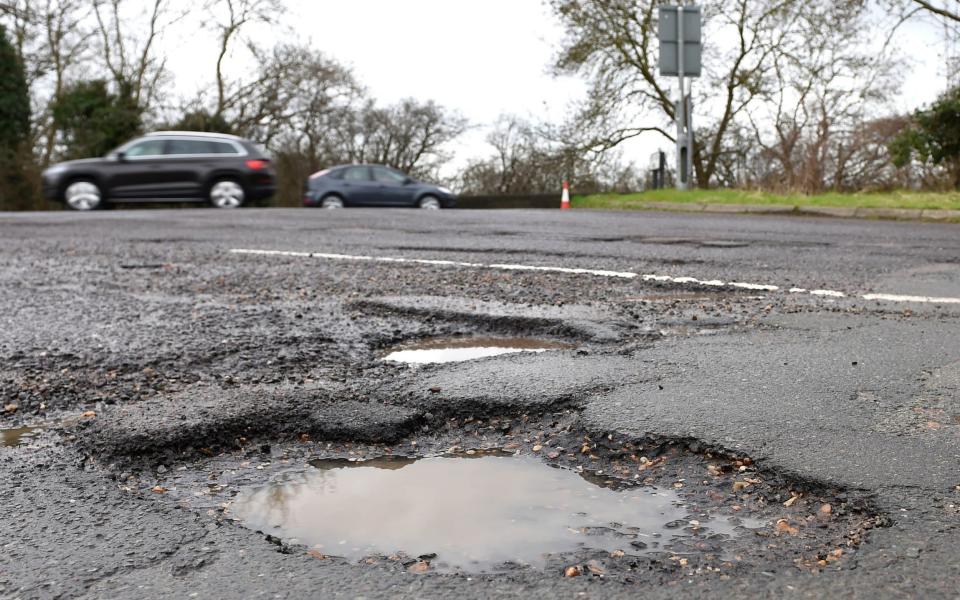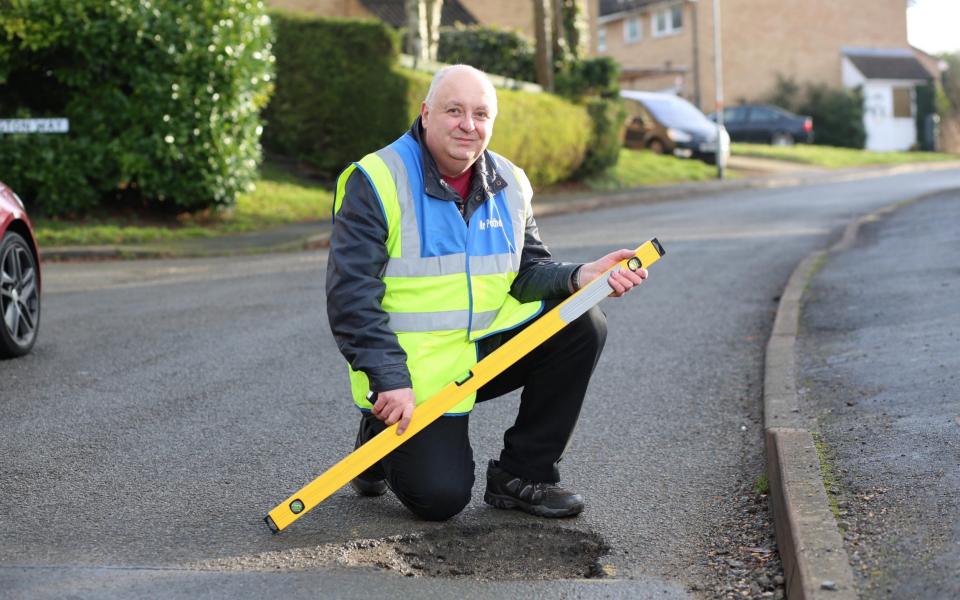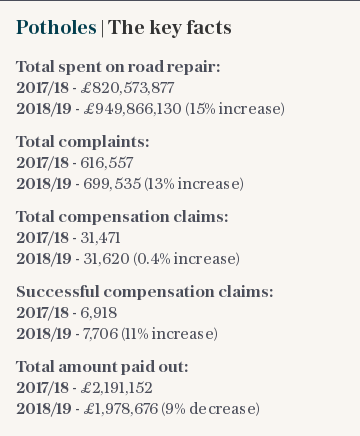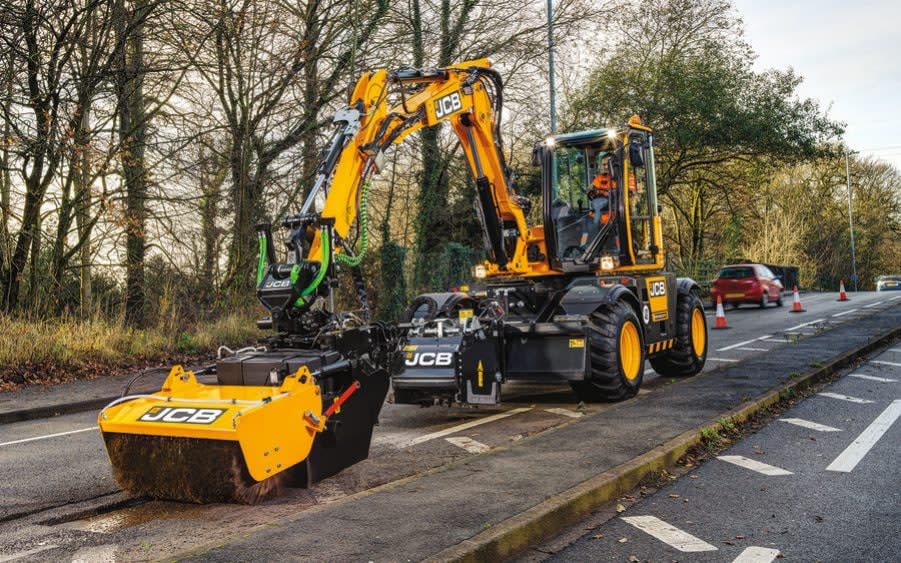Forget HS2 - fix Britain's potholes instead to help repair the economy

The dreaded crunch and jolt of hitting a pothole is the one of the banes of driving in the UK.
At best, it results in grimaces from drivers - but can also mean a hefty repair bill from a burst tyre, bent wheel or damaged suspension.
About 4,000 cars a month are seriously damaged after hitting potholes, according to data from JCB. And it’s not just drivers paying the price - councils are being stung with compensation claims for repair bills.
A less likely, but increasingly real, worry are accidents that result in injury, or worse. Potholes are especially dangerous to those on two wheels, with the deaths of 24 cyclists attributed to hitting poor road surfaces in the decade to 2018.
“It’s sad that I had to start it but it shows how big a problem they are,” says Mark Morrell, or “Mr Pothole”, who is responsible for getting January 15 declared as National Pothole Day.

The former utilities engineer has plenty of experience digging up roads and has been campaigning against poor quality highways since 2013: “Every time I see a pothole I feel disappointed. People can be hurt by them, and drivers suffer damage.”
Generally defined as a defect in the road surface more than 40mm deep, potholes have long been on the rise in Britain.
There’s no official figure on the number of them, only how many that are repaired - almost 1.5m last year in England and Wales according to the Asphalt Industry Alliance’s “Alarm” annual survey.
According to the report, £86m was spent repairing them in 2020, with planned repairs costing £43 each, while patch-ups reacting to complaints or notifications about hazardous holes were priced at £71 a pop.
Bump in the road
To get an idea of the state of the UK’s roads, they rank 37th out of 141 countries according to figures from Global Economy, with a score of 4.9 out a possible 6.5, barely ahead of Rwanda. First-placed Singapore scored the maximum 6.5, just ahead of the Netherlands at 6.4.
New findings released by the RAC for National Pothole Day reveal the state of the roads is getting worse.
Its “Pothole Index” began rating the UK's roads in 2006, giving them a reading of 1.0. The index now stands at 1.44, which the RAC says means drivers are "nearly one and a half times as likely to experience damage caused by a pothole as they were 15 years ago”.
A combination of underfunded repair budgets, more traffic, heavier vehicles and increasingly extreme weather are factors in the deterioration of our highways, according to AA president Edmund King.
Repairing the country’s roads would deliver a boost to the economy, business groups believe.
The Federation of Small Businesses is campaigning for repairs, saying that not only do poor quality roads cause delays for companies, they also drain their resources by forcing them to repair damaged vehicles.
“When roads are poorly maintained, this can seriously hamper small firms from going about their business by causing significant damage to vehicles that are often critical to a company, which is often working without large capital reserves,” said Mike Cherry, the group’s national chairman.
In the Budget last March, Rishi Sunak announced a £2.5bn fund for road improvements. The Autumn Statement revealed £1.6bn of spending to fix potholes and “level-up” uneven roads, though it is not clear if this was new funding.
Still, getting the country’s roads up to scratch is not all that must be done. The Asphalt Association calculates there is an £827m annual funding shortfall in the road repair budget and it would take an 11-year programme costing £11bn to bring local roads up to a level from which they can be maintained cost-effectively.
Although coronavirus lockdowns mean fewer people are on the roads, the public are likely to avoid public transport for years to come as a result, meaning more people in cars and further eroding the highways.
Using HS2 cash
Properly funding the roads could come from other sources. The £106bn earmarked for the HS2 rail line is one, according to the Taxpayer’s Alliance.
“The fact we even have a 'National Pothole Day' should be a wake-up call,” said Harry Fone, the pressure group’s campaign manager. “Clearing Britain's backlog of potholes would be a drop in the ocean compared to the mammoth cost of HS2.
“The estimated price tag would be less than a tenth of the latest predicted cost for the rail project. Pausing HS2 would pay for many road, rail and transport projects to get the infrastructure upgrades they sorely need.”
But persuading ministers to divert money to the roads will be a hard grind, according to the AA’s King.

“In transport there’s an overemphasis on the big schemes - the tunnels, bridges and rail works, rather than things affecting more people every day,” he says. “Our major roads and the motorways aren’t too bad for potholes, but it’s the local roads that suffer because funding for them is not ringfenced.”
King, who says potholes have damaged a number of his cars and even caused the suspension to collapse on one, adds: “There’s nothing more fundamental to drivers than potholes, especially when they damage your car, and they are always the biggest concern we hear about from drivers.”
He says a lack of priority for potholes is not a continuation of the long-complained about “war on the motorist - instead it just seems the Government prefers to tick off the big-ticket transport projects like HS2”.
Pothole punisher

Earlier this week JCB revealed its new weapon for the war on potholes, the £165,000 Pothole Pro. The company says the machine, which is operated by one worker, can repair a pothole in eight minutes - four times faster than conventional methods. Repairs are also cheaper - roughly £30 a pop - and do not require the normal six-person road gang.
JCB chairman Lord Bamford, who oversaw the machine’s development, described potholes as the “scourge of our nation”, adding: “We simply cannot allow our road network to continue to be blighted by potholes.”
“Mr Pothole” himself is less certain about the device. He says it looks useful but is yet to inspect its work and has questions about how it can tackle the largest of repairs.
Instead, he wants potholes to be made a national priority - and one that could help the country recover from the economic damage of the pandemic.
“Roads are quiet now, so let’s get on and repair them,” says Morrell. “We’re going to be using them more for years and properly sorting them out in a massive programme would create masses of jobs. Potholes aren’t seen by the Treasury as important but they are to the public and business.”
“Mr Pothole” might just have hit on a way for Government to solve several issues at once.
